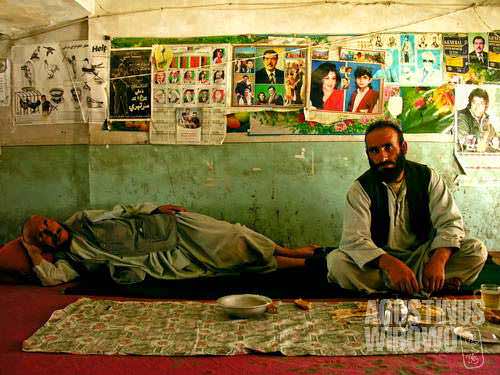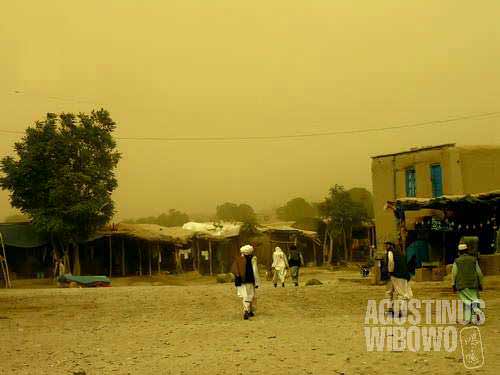Herat – The Journey to Herat
“You got malaria” – a man from Maimana
As everywhere in Afghanistan, long distance journey from Maimana starts as early as 4. I was completely exhausted after the long bus journey from Mazhar the day before, and it was a terrifying night in Massoud’s guest room that I couldn’t rest properly. I was not ready at all to do this 2-day-journey to Heart, but Massoud, probably disappointed of not being able to get me, rushed me out of his house as early as 3:30. I walked like a drunk.
The only vehicle going to Herat was only Falancoach type, a minibus where passengers are stuffed like tinned sardine and there is no way to stretch the body for relaxing. I know the journey would be very painful. The cars to Herat depart from Darvaza-e-Herat (Herat Gate) quite out of the town. They were ready at 4 but the cars got full at 5. When I arrived I immediately chose a window seat and sleep, after paying the fare of 1000 Af (20$) – quite uncommon as in Afghansitan usually fare is paid after the ride.
Later to my surprise, my seat might be the worst one in the car. For a curious reason, on the wall just next to my head there were two ring nails stuck there, the window was not open-able, and there was a metal bar lying horizontally along the window at the height of my cheek. The road from Maimana is mountainous road through dry, bumpy, dusty sand hills. Not only once the ring nails punched my forehead and my cheek to be slapped by the metal bar. There was no way I could compensate my lack of rest the night before.
The mightiest part of this journey was an unbelievable of security checks (taloshi). There is always at least a soldier in lonely hills in the middle of nowhere, stops the cars, asks all of the passengers to get out, and does pointless checks. The checks are such painful and thorough but not of so much benefit. Once the police checked the car thoroughly including searching the number plate with a screwdriver whether there was opium hidden, but he was too lazy to check the passengers’ luggage or pockets. Or vice versa. Maybe the real point was giving the chance for the passengers to do some exercise, to stretch their legs and do the toilet business. Sometimes the lonely guard also asked money from the passengers to buy food.
I was too weak for all of these checks. My head was very heavy; my body was getting on fire. It was very difficult to breath. I didn’t know much about scenery outside, but it was very dusty and there was big sandstorm. Still amazingly, there were herdsmen grazing their animals in the sand hills (eating sand?). I couldn’t observe anything. My window couldn’t be opened and I was more busy with the nails and metal bar. Every time I fell asleep my face was slapped again by the metal bar. Later I learnt the way of making turban from my shawl, to protect my head from the nails and the dust.
In the first day, the car broke many times, and we failed to have lunch at 12. We were still far away from Murghab, the nearest bazaar town. The Herati man sitting in front of me said that Murghab was near, only 1 hour to go. Time flew slowly, second by second, painfully. I felt my head very dizzy and there was no place lay it down. To my right, the metal bar. To my left, another passenger. To my front, too bumpy. To my back, too low. Other symptoms started to appear: stomach ache and sneeze.
It was not until 4:30 the car reached Murghab. I almost died of hunger. I was too much dizzy to take my food, I lost my appetite. Murghab was completely covered by sand, due to the huge sandstorm. The air outside was a complete yellow. Our driver decided to stop in Murghab instead of continuing to Qala-e-Nao (literally means New Fort) as traveling with such low visibility in no-road area was too risky. I felt relieved. At least I might take proper rest here.
When you travel for long distance in Afghanistan, you and other passengers are mosafir (travelers). For the mosafirs, there are always restaurants along the way to provide food and free accommodation: mattress on the floor. I took a mattress and lay down on the floor at the corner of the restaurant. There were no chairs and tables in Afghan restaurants. Everybody sits and eats on floor, busy of watching erotic dance VCD.
My body temperature was as hot as an oven. I sweated a lot, which was good, as sweating brought the heat out. Until the dinner time, I was still sweating, and my clothes became very wet.
The existence of a sick foreigner attracted attention of the hospitable Afghans. A man from Maimana, now heading home from Heart, gave me a massage and suggested me to go back to Maimana to be hospitalized. “You got malaria!” said him who claimed himself as a doctor. Knowing someone getting malaria just from giving massage is not sign of professional doctor, and I knew the difference between malaria and getting cold. I didn’t have the energy to argue though. The men also prepared wet towel to compress my forehead and put on a blanket on me. I couldn’t sleep. The noisy TV was playing the infamous Indian TV Serial about the mother-in-law and then turned to be repetitive, repetitive, repetitive, Afghan traditional music. Until midnight.
I woke up at 3:30 when the enthusiastic passengers from other cars were excitedly starting their journey as early as possible. My head was still dizzy but my body temperature already went down little bit. Both legs now were as stiff as sticks, and in this condition I had to be ready again to be stuffed in my tiny space in the lovely Falancoach together with other fully bearded and turbaned passengers. I wrapped the metal bar with my jacket so now I could lie on the bar during the way. It was more comfortable.
The road up to Qala-e-Nao was not an easy track. Other passenger car couldn’t make the climb on the sandy track. Our car tried to pull it with a wire but failed. After 2 hours of attempting, both driver gave up and we continued our journey.
At 10:30 we reached Qala-e-Nao, the capital of Badghis province. This is another dusty, sleepy town with some rows of shops. Electricity is not available but from private generators. It was an oasis though, after the boring dusty and bumpy journey.
After the arrival of investment from all over the world, Afghanistan villages now flourished by foreign products like Pepsi, Miranda, Coca Cola, and Iranian juice. Afghans developed the habit of throwing the trash everywhere. On the carbonated drink bottle, usually there’s writing “don’t trash” but the message was in English and nobody reads. Like the passengers in our minibus, it’s not uncommon to throw anything out the window to the desert hills. I also developed the same habit, I became more and more like the Afghans. Who knows, thousand years later, the Afghan archeologist come to these hills in the middle of nowhere to discover Pepsi as the way of life of their ancestors.
The driver now was so lavish about time. We stopped for lunch for an hour. I found, despite of my hunger and weak body, I lost my appetite. It was sign of more serious symptoms.
Herat was still 6 more hours to reach. The journey from Qala-e-Nao to Herat was as bumpy, dusty, and dizzying as before. My body was getting weaker and weaker and I was no more able to even sleep. Time passed microsecond by microsecond, painfully at its maximum extent. The driver seemed also tired. The car stopped from 1 hour for prayers time, another 1 hour for cooling down the machine, and 30 minutes for tea-time (why teatime was not done when waiting for the machine to be cooled down? A strange time management). The prayer stops in Afghanistan are compulsory. The religious Afghans don’t want to loose any chance of delivering the prayers, and thus public transports always stop on prayer times. Some bearded passengers dragged me to do prayers (they thought I was Muslim as I insisted not to mention my religion), but I managed to escape by telling them I was completely ill.
The two young boys were playing on the seats while the other delivering their prayers (namaz). “Man bilkul mariz am (I’m completely ill)” I said to them. They stopped playing, giggled, and left me alone sleeping. The wind outside was really strong and I preferred the melancholy life inside the car for every minute. Due to the long stops for prayers and many other businesses, we arrived in Herat almost dark. 60 km before Herat the road turned miraculously to be asphalt highway. With limited number of vehicles in Afghanistan, this two-line road can be traversed with speed up till 90 km/h.
Checks might be the only duty of bored Afghan police to do. The passengers were lined out of the car with their own luggage, then the police checked the documents and luggage one by one. This fat police guy kicked my luggage, asking, “Chi ast? (what’s this?), searched my pockets “Chi ast?”, “Chi ast?”, and eventually took the chance grabbing my dick, “Chi ast?”
At last I arrived in Herat, took a room in a hotel (Hotel Jam, 300 Af) and slept like a pig.








Leave a comment